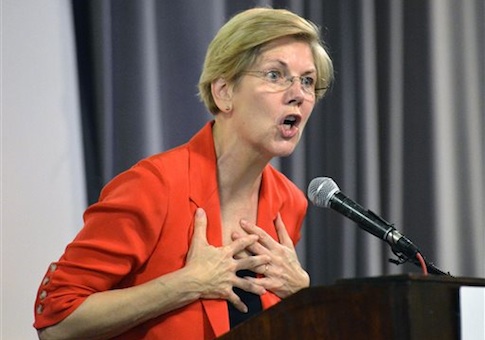Democratic Senate candidates in coal-reliant states are turning to Sen. Elizabeth Warren (D., Mass.), a progressive favorite and potential 2016 presidential candidate, to give them a boost in closely contested races this fall despite her support for a regulation on coal-fired power plants that is deeply unpopular in those states.
After the proposed Environmental Protection Agency (EPA) regulation was announced in June, Warren called it a "powerful step" for addressing climate change. She will stump for West Virginia Democrat Natalie Tennant in coal country on Monday after appearing with Kentucky Democrat Alison Lundergan Grimes at the end of last month.
A PAC affiliated with Warren—PAC for a Level Playing Field—has contributed $10,000 to Tennant, Grimes, and several other Democratic Senate candidates in coal-dependent states, according to the Center for Responsive Politics.
The EPA regulation aims to cut carbon pollution from power plants by 30 percent by 2030. Experts say the rule could close hundreds of coal plants, result in hundreds of thousands of job losses, and raise annual electricity costs for consumers by billions of dollars. The rule will be finalized next year after a public comment period.
Both Tennant and Grimes have said they oppose the regulation despite partnering with Warren and raising money with liberal anti-coal groups.
"Natalie Tennant's embrace of Elizabeth Warren's aggressively liberal, anti-West Virginia agenda is truly astounding, but sadly, not surprising," said Amy Graham, spokeswoman for Rep. Shelley Moore Capito (R., W.Va.), Tennant’s opponent. "Natalie Tennant has repeatedly denounced those behind the War on Coal and Obamacare while seeking their money and support behind voters' backs."
"Bringing in one of the staunchest opponents of coal and West Virginia's way of life is just the latest instance of Natalie Tennant's blatant hypocrisy and disrespect for the people of this state," she added.
Warren downplayed her disagreement with Tennant on coal, portraying Capito as beholden to financial interests in a statement after the campaign event was announced.
"Wall Street already has enough senators looking to advance its interests, and West Virginia deserves a senator like Natalie who will wake up every morning and go to bed every night focused on how to fight for working families," Warren said.
Tennant’s campaign did not respond to a request for comment.
A recent survey of likely voters in eight coal-reliant, Senate battleground states found that an average of 47 percent oppose the EPA proposal, about 37 percent support it, and 16 percent do not have an opinion about it.
Additionally, an average of 76 percent of voters said President Barack Obama should focus more time on creating jobs rather than combating climate change, according to the poll commissioned by the National Mining Association.
The survey also asked about a recent study, commissioned by the U.S. Chamber of Commerce, which examined a power plant regulatory proposal similar to the EPA rule. That study found that the rules would lead to an average of 224,000 fewer jobs per year through 2030 as well as $17 billion in higher annual electricity costs for U.S. consumers during that timeframe.
When informed about the study, 62 percent of voters said they were more likely to oppose the EPA rule.
The study also said the rules would only reduce global carbon dioxide emissions by 1.8 percent—a reduction that pales in comparison to the 31 percent increase projected by 2030.
Republicans and coal advocates have also questioned Warren over her support for LTV Steel, a former industrial conglomerate, in its 1990s fight against a congressional requirement that it pay millions of dollars into a fund for its retired coal miners’ health care. Warren received about $10,000 to petition the U.S. Supreme Court to review LTV’s case, which the court rejected.
Warren’s campaign claimed in 2012 that the retirees’ benefits were not in danger because the fund, mandated by the Coal Act, had a surplus at the time. She also believed that a ruling against LTV would imperil future claimants in bankruptcy cases, her campaign said.
Warren argued that companies’ obligations under the Coal Act should be addressed during the bankruptcy process, not after, to ensure claimants receive compensation if the companies shut down. The case against LTV centered on whether the company could be forced to pay out more money after completing its reorganization under bankruptcy laws in 1986.
Warren’s opponents at the time, including the Clinton administration, union leaders, and Sen. Jay Rockefeller (D., W.Va.), said exempting LTV could threaten the solvency of the fund by encouraging other companies to avoid payments.
Capito is leading Tennant by 10 percentage points, according to an average of polls compiled by Real Clear Politics. Senate Minority Leader Mitch McConnell (R., Ky.) holds a slight lead over Grimes in one of the closest races in the country.
